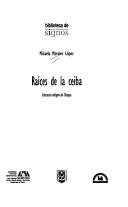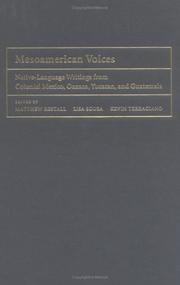| Listing 1 - 10 of 16 | << page >> |
Sort by
|
Book
ISBN: 9992200456 Year: 1999 Publisher: Guatemala Asociación cultural B'eyb'al
Abstract | Keywords | Export | Availability | Bookmark
 Loading...
Loading...Choose an application
- Reference Manager
- EndNote
- RefWorks (Direct export to RefWorks)
Indian literature --- Maya literature --- History and criticism
Book
ISBN: 1457117533 145711755X 1607321807 9781607321804 9781457117558 9781457117534 9781607321798 1607321793 Year: 2012 Publisher: Boulder University Press of Colorado
Abstract | Keywords | Export | Availability | Bookmark
 Loading...
Loading...Choose an application
- Reference Manager
- EndNote
- RefWorks (Direct export to RefWorks)
Maya poetry --- Maya literature --- Belizean literature --- History and criticism.
Book
ISBN: 1438472609 9781438472607 9781438472591 1438472595 Year: 2018 Publisher: Albany
Abstract | Keywords | Export | Availability | Bookmark
 Loading...
Loading...Choose an application
- Reference Manager
- EndNote
- RefWorks (Direct export to RefWorks)
Recovering Lost Footprints, Volume 2 is an in-depth analysis of the sociohistorical conflict impacting Indigenous communities in Latin America. Continuing the project he began in volume 1, Arturo Arias analyzes contemporary Peninsular and Chiapanecan Maya narratives. He examines the works of Yucatecan writers Jorge Cocom Pech, Javier Gómez Navarrete, Isaac Carrillo Can, and Marisol Ceh Moo. For Chiapas, Arias looks at the works of Tseltal novelist Diego Méndez Guzmán, Tsotsil short-story writer Nicolás Huet Bautista, and Tseltal narrative writer Josías López Gómez. Arias problematizes the nature of Western modernity and the crisis of Western models of development in the present. By way of his analysis, he suggests that we are facing a historical impasse because we have neglected native knowledges that offer alternative codes of ethics and beingness that emerge from Indigenous cosmovisions. The text skillfully contributes to and strengthens debates between US-centered and Latin American cultural studies theorists, as well as the hemispheric expansion of Native American and Indigenous Studies. Recovering Lost Footprints, Volume 2 is inspired more by the past as it impinges upon a continuing, constantly expanding present. Arias's reading of Maya literatures forces us to reconsider the space-time structure of Western thinking. Indeed, this book is intriguing precisely because it views literature from an Indigenous perspective, evidencing how that social space is full of multiple contrasting experiences and historical processes.
Maya literature --- Guatemalan literature --- Belizean literature --- History and criticism.
Book
ISBN: 9781438467412 1438467419 9781438467399 Year: 2017 Publisher: Albany
Abstract | Keywords | Export | Availability | Bookmark
 Loading...
Loading...Choose an application
- Reference Manager
- EndNote
- RefWorks (Direct export to RefWorks)
Recovering Lost Footprints is the first full-length critical study to analyze Latin American Indigenous literary narratives in a systematic manner. In the book, Arturo Arias looks at Maya narratives in Guatemala. The study of these works is intended to spark changes so that constitutions recognize these cultures, their rights, their languages, their centers of worship, and their cosmologies. Through this study, Arias problematizes the partial or full omission of Latin America's original inhabitants from recognized citizenry. This book analyzes these elements of exclusion in the novelistic output of three salient figures, Luis de Lión, Gaspar Pedro González, and Víctor Montejo. The works by these writers offer evidence that most native people have entered modernity without renouncing their respective cultures or the specifics of their singular identities. The philosophical ethics elaborated in the texts, such as respect for nature and recognition of the holistic value of natural beings, enable non-Indigenous readers to both understand and relate to these values.
Maya literature --- Guatemalan literature --- Belizean literature --- History and criticism.

ISBN: 9789707014268 9707014261 Year: 2004 Publisher: [México]: universidad autónoma metropolitana. Unidad Iztapalapa. División de ciencias sociales y humanidades,
Abstract | Keywords | Export | Availability | Bookmark
 Loading...
Loading...Choose an application
- Reference Manager
- EndNote
- RefWorks (Direct export to RefWorks)
Maya literature --- Mexican literature --- Indian mythology in literature
Book
ISBN: 0292720378 0292771452 Year: 1983 Publisher: University of Texas Press
Abstract | Keywords | Export | Availability | Bookmark
 Loading...
Loading...Choose an application
- Reference Manager
- EndNote
- RefWorks (Direct export to RefWorks)
Indians of Mexico --- Maya literature --- Mayas --- Folklore. --- Translations into English.
Book
Year: 1970 Publisher: México : Editorial J. Mortiz,
Abstract | Keywords | Export | Availability | Bookmark
 Loading...
Loading...Choose an application
- Reference Manager
- EndNote
- RefWorks (Direct export to RefWorks)
Maya literature --- Spanish literature. --- Littérature espagnole --- Translations into Spanish.
Book
ISBN: 0486234657 9780486234656 Year: 1977 Publisher: New York Dover Publications, Inc.
Abstract | Keywords | Export | Availability | Bookmark
 Loading...
Loading...Choose an application
- Reference Manager
- EndNote
- RefWorks (Direct export to RefWorks)
Maya language --- Maya literature --- Bibliography --- Grammar --- History and criticism
Book
Year: 1921 Volume: 9 Publisher: Cambridge, Mass. : Published by the Museum,
Abstract | Keywords | Export | Availability | Bookmark
 Loading...
Loading...Choose an application
- Reference Manager
- EndNote
- RefWorks (Direct export to RefWorks)
Maya language --- Maya literature --- Littérature maya --- Bibliography --- Grammar --- History and criticism --- Histoire et critique

ISBN: 1316223396 1316223795 0511811101 0521812798 052101221X Year: 2005 Publisher: Cambridge : Cambridge University Press,
Abstract | Keywords | Export | Availability | Bookmark
 Loading...
Loading...Choose an application
- Reference Manager
- EndNote
- RefWorks (Direct export to RefWorks)
Mesoamerican Voices, first published in 2006, presents a collection of indigenous-language writings from the colonial period, translated into English. The texts were written from the sixteenth through the eighteenth centuries by Nahuas from central Mexico, Mixtecs from Oaxaca, Maya from Yucatan, and other groups from Mexico and Guatemala. The volume gives college teachers and students access to important new sources for the history of Latin America and Native Americans. It is the first collection to present the translated writings of so many native groups and to address such a variety of topics, including conquest, government, land, household, society, gender, religion, writing, law, crime, and morality.
Indian literature --- Nahuatl literature. --- Maya literature. --- Nahuatl literature --- Maya literature --- Languages & Literatures --- Native American & Hyperborean Languages --- Belizean literature --- Aztec literature --- Mexican literature (Nahuatl) --- Indian literature (American Indian) --- Literature --- History and criticism. --- History and criticism --- Indian authors
| Listing 1 - 10 of 16 | << page >> |
Sort by
|

 Search
Search Feedback
Feedback About UniCat
About UniCat  Help
Help News
News